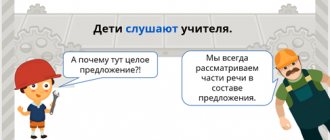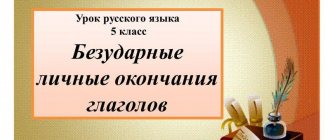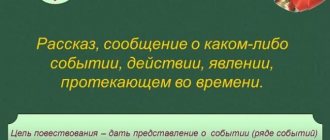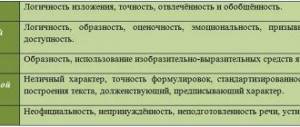Signs
1. Permanent:
- type (perfect/imperfect);
- conjugation I or II;
- transitivity (transitive/intransitive);
- reflexivity (verbs that are not used without -СЯ ).
2. Fickle
- mood (indicative, conditional, imperative);
- number (singular (I’m walking, walking, going), plural (let’s go, walked, let’s go);
- time (past, present, future);
- gender (masculine, feminine, neuter);
- person (first, second, third);
- reflexivity (verbs having reflexive and non-reflexive forms).
Verb type
In Russian, verbs can be of two types: perfect and imperfect.
- perfect form - verbs answer the question what to do? and denote an action that has already been completed or an action in the initial stage of execution (decide, read, sing, sing);
- imperfect form - verbs answer the question what to do? (decide, read, sing, begin to sing).
REMEMBER!
- Only an imperfect form : to fawn, call to each other, shoot, glance, whistle, sit down, cough, sentence, belong, walk, regret.
- Only the perfect form: to thunder, to interrogate, to thunder, to stride, to make noise, to find yourself, to spoil, to run, to lie down, to pour, to dream, to need, to hold, to think, to sit, to gush.
Conjugation of verbs
Verbs can be conjugated, that is, they can change according to persons and numbers.
There are 2 verb conjugations:
I conjugation - verbs in the indefinite form end in -ITE, -ATE, -OTY, -UT, -YAT, -YTY ; in 3rd person plural hours end in -UT, -YUT (sing, hide, prick, pull, winnow, wash);
II conjugation - verbs in the indefinite form end in -IT ; in 3rd person plural hours end in -AT, -YAT (carry, saw, spend).
EXCEPTIONS!
- These verbs belong to the I conjugation: shave, lay, build, swell.
- These verbs belong to the II conjugation: drive, breathe, hold, depend, hear, see, hate, endure, twirl, offend, watch.
Method for determining verb conjugation
- If the personal ending is stressed, then we determine by the personal ending: 1. If -U/-YU, -YOU, -YOT, -YOM, -YOTE, -UT/-YUT , then this is the I conjugation. 2. If -U/-YU, -ISH, -IT, -IM, -ITE, -AT/-YAT , then this is the II conjugation.
- If the personal ending is unstressed, then we determine by the indefinite form 1. If the indefinite form ends in -IT (except shave, lay), if it is one of 7 verbs ending in -ITE (look, see, depend, hate, endure, twirl, offend) , if this is one of the 4 verbs starting with -AT (hear, drive, breathe, hold), then this is the II conjugation. 2. All other verbs with unstressed personal endings belong to the I conjugation.
REMEMBER!
The verbs want and run are classified as heteroconjugable.
How to determine the infinitive form of a verb?
Each verb has its own specific form.
The easiest way to determine the infinitive form of a verb is to ask the question “What to do?” or “What to do.”
If the verb is a logical answer to this question, then it is an infinitive.
You can also check the initial form of a verb using the ending. The initial form of a verb can have several types of endings:
- 1st type – ending –т (or –ти). Examples: walk, run, mow, write, search, carry, graze, inflict
etc.
- 2nd type – zero ending. A verb in its initial form has a zero ending if its root ends with -ch. For example: pound, burn, strain, attract
and so on.
- Often at the end of an indefinite verb there is a suffix -sya. Examples: learn, say hello, get carried away, get married, explode, catch fire
etc.
Verbs in the indefinite form have an aspect, transitivity or intransitivity, and conjugation.
Indefinite form - lying down
, definite –
lies, lay
.
Transitive and intransitive verbs
Verbs in Russian are transitive and intransitive.
- Transitive - denote an action that passes to some object, denoted by a noun, in the accusative case without a preposition (if the action passes to part of the object, the accusative case is replaced by the genitive) - see off your sister, cut down a birch tree, read a book, sew a suit, drink milk.
- Intransitive - denote an action that does not transfer to other objects (verbs with the suffix -СЯ - intransitive) - walk in the garden, rush to catch the train, play sports, swim in the sea.
Concept and morphological characteristics
The infinitive, or indefinite form of a verb, is its initial form . This is exactly how verbs are presented in dictionaries: drive, leave, reconcile. In the infinitive form, an action, process or state is called, regardless of who, at what time and how they were committed. Verbs in the infinitive form answer the questions “what to do?”, “what to do?”. In a sentence, they can be one of the parts of a compound predicate, expressed by the future complex tense, predicate, subject, or sometimes a minor member. This is an unchangeable and unconjugated form of the verb, which has only constant grammatical features.
First of all, it is a form, perfect or imperfect. Imperfective verbs denote an action that lasts without a specific indication of time: sentence, tell, borrow. Such actions are also called eternal, since they answer the question “what should I do?”: My neighbor is going to go to the garden; Marriages are meant to be made in heaven; It's time to decide on your choice of profession. Perfect verbs denote an action that has already taken place, or one that will definitely happen. The question is asked “what to do?”: You need to write this quote down in your notebook.
Verbs can be reflexive or non-reflexive. The postfix -sya or -sya helps to determine this form: aim, train, emphasize. In these verbs the action is directed towards oneself, and they will be reflexive. Non-reflexive verbs denote actions aimed at someone or something: oblige, note, tell. The sign of transitivity of the infinitive can be determined by an additional adjacent word that indicates the direction of action. It could be:
- a noun or pronoun in the accusative case without a preposition: carry the flag, emphasize the ending, parse;
- a noun in the accusative or genitive case without a preposition, indicating a relationship or part of something: write down a task, wait for luck;
- a noun or pronoun in the genitive case, used in negation: do not judge him, do not abandon the child.
The action of the intransitive infinitive is indicated by one word. A constant feature of the infinitive is conjugation.
The infinitive is used to form new forms and check for correct spelling. In case of doubt, the word is put in the initial form: come up with - come up with (2nd conjugation). There are words from which it cannot be formed, for example, numb.
Verb mood
In the Russian language, there are three moods of the verb: indicative, subjunctive (conditional) and imperative.
- indicative mood - denotes an action that happened, is happening or will happen (slept, sleep, will sleep).
- subjunctive (conditional) mood - denotes a desired or possible action, formed using the past tense form of the verb and the particle BY (I would write, you would come).
- imperative - denotes a call to action, an order, a request (bring, stand, stand up).
Using the initial form of the verb
Why do you need the initial form:
- Thanks to the infinitive, you can determine the conjugation of the verb.
And at the same time, conjugation serves as an excellent hint when writing the endings of present tense verbs. Many people have difficulty writing the endings -ish, -eat, -it, -et, -im, -eat. Knowing the conjugations of verbs, you can easily cope with them.
- Past tense verbs are also formed from the initial form of the verb, the spelling of the endings of which depends on the infinitive.
For example:
dispel - dispelled, understand - understood, survive - survived.
Verb tense
Verbs change tenses (only in the indicative mood). There are present, past and future (simple and complex) tenses of the verb.
- The past tense refers to actions that have already completed at the time of speech. Answer the questions: what did you do? what did you do? what did it do? what they were doing?
They change according to gender and number: I / he walked. (m.r., units); You/she walked. (f.r., units); It was walking. (avg., units); We/you/they were walking. (plural).
- The present tense refers to actions that are happening at the time of speech. They answer the questions: what am I doing? What are you doing? what is he doing? what are we doing? what you are doing? what are they doing?
They change according to persons and numbers: (I am walking. (1 l., singular); You are coming. (2 l., singular); He/She is coming. (3 l., singular) ; We are coming. (1 l., plural); You are coming. (2 l., plural); They are coming. (3 l., plural)).
- The future tense refers to actions that will happen in the future. They answer the questions: what will I do? what will you do? what will he do? What will we do? what will you do? what will they do?
They change according to persons and numbers: (I will go. (1 l., singular); You will go. (2 l., singular); He/she/it will go. (3 l., singular). .); We will go. (1 l., plural); You will go. (2 l., plural); They will go. (3 l., plural)).
Future forms
- simple (from perfective verbs: I will see, I will see, I will see, I will see, I will see, I will see).
- complex (from imperfective verbs: I will read, you will read, will read, we will read, you will read, they will read).
Morphological features of the infinitive form of the verb
The initial form of the verb denotes the action or state of an object, but at the same time does not have the inconsistent verbal features of person, number, mood, tense and gender. The infinitive has only constant morphological features:
- view
- transitivity
- repayment
- conjugation.
The stars began to slowly fade.
Let us indicate the morphological features of the word “go out”.
I. Go out (what to do?)
- verb, denotes action;
- indefinite form
- imperfect species
- intransitive
- irrevocable
- I conjugation.
II. The syntactic role is part of the compound verbal predicate “began to go out.”
The dream of escaping from the captivity of household chores was strong in her.
I. Break out (what to do?)
- verb, denotes action;
- indefinite form
- perfect view
- intransitive,
- returnable
- I conjugation.
II. Syntactic role is an inconsistent definition.
The infinitive form of a verb can be any part of a sentence.
Spelling -TSYA and -TSYA
REMEMBER!
To find out whether a verb is written -TSYA or -TSYA , you need to ask a question. If you have questions about what to do?/what to do? it is written -TSYA , and when asked what does it do?/what will it do? written -TSYA .
- What to do? swim, laugh, tinker, be lazy, study.
- What is he doing? bathes, laughs, tinkers, is lazy, studies.
Definition
In the textbook for grade 4, when children are introduced to this concept, a rule is given.
The indefinite form of a verb is the initial and unchangeable form from which all verbal parts of speech (participles, gerunds, verbal adjectives) and forms of the verb formed during conjugation are formed.
What questions does the indefinite form answer: what to do? (what to do?).
The indefinite form is called in linguistics by the term “infinitive” (from the Latin Infinitus). Using the infinitive, it is impossible to say who and when performs any action (for example, “walk”: it is not clear who did it and when, there is no indication of person, number, or time). Its morphological features are the suffixes -т (-ти) (for example, go ti , say ) or ending the root with -ch (for example, lie , сеч ) .
Spelling verb suffixes
- -Ть is a suffix of the indefinite form of the verb (plow , drink , build , breathe ) .
- -L suffix of the past tense (hear - heard l , read - read l ).
- -NU-, -A-, -I-, -I- are unchangeable suffixes of verbs (gloh nut , work , ve ve , zate ya , ka ya la ya cherish , toil , hope , hope , sow , sow , tea , feel , build , stand , double , morning , glue ) .
- -OVA-/-EVA- are written in verbs that are singular in the 1st person. numbers end in -YU, -YUYU (command yu – command ovat , vo yuyu – voyat ’).
- -YVA-/-IVA- are written in verbs that are singular in the 1st person. numbers end in -YVAYU, -IVAYU (I ’m – late , insist – insist ) .
- -E/Т in verbs with the prefix OBES-/OBEZ - written in intransitive verbs with the prefix OBES-/ OBEZ- denoting an action focused on the subject himself ( to become weak from fatigue, to lose blood (to oneself)).
- -И/Т in verbs with the prefix OBES-/О Bez- is written in transitive verbs with the prefix OBES-/ OBEZ- , denoting an action directed at someone else ( depowering the enemy , providing blood ( someone another)).
What is the infinitive form of the verb used for?
Firstly, many word forms of verbs have personal endings that are unstressed. For example, doubts arise about the spelling of the letters “e” or “i” in the forms of words:
- are you building or are you building,
- glues or glues,
- get better or get better.
To correctly write words in such a situation, it is necessary to establish the conjugation of the verb according to its indefinite form. The algorithm for this is explained in detail in this article.
Secondly, in the past tense of many verbs the suffix is unstressed, for example:
- glue-t - glue-l,
- sow - sow,
- hate - hated.
Many verb forms are formed from the indefinite stem, for example:
sow - sow-l, sow-louse, sow-ya-nn-y, sow-in, sow-louse.
Therefore, it is important to correctly identify the indefinite form, and in it an unstressed verbal suffix, knowledge of which will help in writing verbal forms of the past tense, active and passive participles of the past tense, and forms of gerunds.



